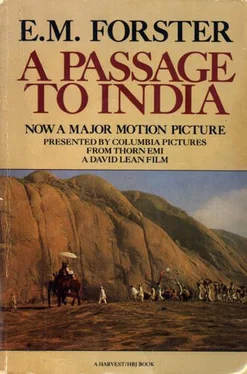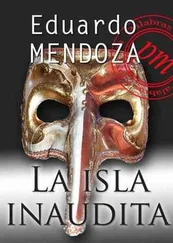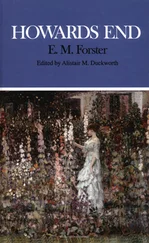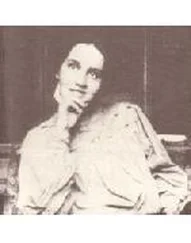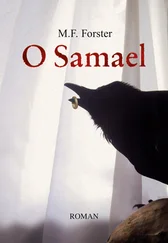A cobra of papier-mвchй now appeared on the carpet, also a wooden cradle swinging from a frame. Professor Godbole approached the latter with a red silk napkin in his arms. The napkin was God, not that it was, and the image remained in the blur of the altar. It was just a napkin, folded into a shape which indicated a baby's. The Professor dandled it and gave it to the Rajah, who, making a great effort, said, "I name this child Shri Krishna," and tumbled it into the cradle. Tears poured from his eyes, because he had seen the Lord's salvation. He was too weak to exhibit the silk baby to his people, his privilege in former years. His attendants lifted him up, a new path was cleared through the crowd, and he was carried away to a less sacred part of the palace. There, in a room accessible to Western science by an outer staircase, his physician, Dr. Aziz, awaited him. His Hindu physician, who had accompanied him to the shrine, briefly reported his symptoms. As the ecstasy receded, the invalid grew fretful. The bumping of the steam engine that worked the dynamo disturbed him, and he asked for what reason it had been introduced into his home. They replied that they would enquire, and administered a sedative.
Down in the sacred corridors, joy had seethed to jollity. It was their duty to play various games to amuse the newly born God, and to simulate his sports with the wanton dairyniaids of Brindaban. Butter played a prominent part in these. When the cradle had been removed, the principal nobles of the state gathered together for an innocent frolic. They removed their turbans, and one put a lump of butter on his forehead, and waited for it to slide down his nose into his mouth. Before it could arrive, another stole up behind him, snatched the melting morsel, and swallowed it himself. All laughed exultantly at discovering that the divine sense of humour coincided with their own. "God si love!" There is fun in heaven. God can play practical jokes upon Himself, draw chairs away from beneath His own posteriors, set His own turbans on fire, and steal His own petticoats when He bathes. By sacrificing good taste, this worship achieved what Christianity has shirked: the inclusion of merriment. All spirit as well as all matter must participate in salvation, and if practical jokes are banned, the circle is incomplete. Having swallowed the butter, they played another game which chanced to be graceful: the fondling of Shri Krishna under the similitude of a child. A pretty red and gold ball is thrown, and he who catches it chooses a child from the crowd, raises it in his arms, and carries it round to be caressed. All stroke the darling creature for the Creator's sake, and murmur happy words. The child is restored to his parents, the ball thrown on, and another child becomes for a moment the World's desire. And the Lord bounds hither and thither through the aisles, chance, and the sport of chance, irradiating little mortals with His immortality… When they had played this long enough—and being exempt from boredom, they played it again and again, they played it again and again—they took many sticks and hit them together, whack smack, as though they fought the Pandava wars, and threshed and churned with them, and later on they hung from the roof of the temple, in a net, a great black earthenware jar, which was painted here and there with red, and wreathed with dried figs. Now came a rousing sport. Springing up, they struck at the jar with their sticks. It cracked, broke, and a mass of greasy rice and milk poured on to their faces. They ate and smeared one another's mouths and dived between each other's legs for what had been pashed upon the carpet. This way and that spread the divine mess, until the line of schoolboys, who had somewhat fended off the crowd, broke for their share. The corridors, the courtyard, were filled with benign confusion. Also the flies awoke and claimed their share of God's bounty. There was no quarrelling, owing to the nature of the gift, for blessed is the man who confers it on another, he imitates God. And those "imitations," those "substitutions," continued to flicker through the assembly for many hours, awaking in each man, according to his capacity, an emotion that he would not have had otherwise. No definite image survived; at the Birth it was questionable whether a silver doll or a mud village, or a silk napkin, or an intangible spirit, or a pious resolution, had been born. Perhaps all these things! Perhaps none! Perhaps all birth is an allegory! Still, it was the main event of the religious year. It caused strange thoughts. Covered with grease and dust, Professor Godbole had once more developed the life of his spirit. He had, with increasing vividness, again seen Mrs. Moore, and round her faintly clinging forms of trouble. He was a Brahman, she Christian, but it made no difference, it made no difference whether she was a trick of his memory or a telepathic appeal. It was his duty, as it was his desire, to place himself in the position of the God and to love her, and to place himself in her position and to say to the God, "Come, come, come, come." This was all he could do. How inadequate! But each according to his own capacities, and he knew that his own were small. "One old Englishwoman and one little, little wasp," he thought, as he stepped out of the temple into the grey of a pouring wet morning. "It does not seem much, still it is more than I am myself."
Dr. Aziz left the palace at the same time. As he returned to his house—which stood in a pleasant garden further up the main street of the town—he could see his old patron paddling and capering in the slush ahead. "Hullo!" he called, and it was the wrong remark, for the devotee indicated by circular gestures of his arms that he did not desire to be disturbed. He added, "Sorry," which was right, for Godbole twisted his head till it didn't belong to his body, and said in a strained voice that had no connection with his mind: "He arrived at the European Guest House perhaps—at least possibly."
"Did he? Since when?"
But time was too definite. He waved his arm more dimly and disappeared. Aziz knew who "he" was—Fielding—but he refused to think about him, because it disturbed his life, and he still trusted the floods to prevent him from arriving. A fine little river issued from his garden gate and gave him much hope. It was impossible that anyone could get across from Deora in such weather as this. Fielding's visit was official. He had been transferred from Chandrapore, and sent on a tour through Central India to see what the remoter states were doing with regard to English education. He had married, he had done the expected with Miss Quested, and Aziz had no wish to see him again.
"Dear old Godbole," he thought, and smiled. He had no religious curiosity, and had never discovered the meaning of this annual antic, but he was well assured that Godbole was a dear old man. He had come to Man through him and remained on his account. Without him he could never have grasped problems so totally different from those of Chandrapore. For here the cleavage was between Brahman and non-B rahman; Moslems and English were quite out of the running, and sometimes not mentioned for days. Since Godbole was a Brahman, Aziz was one also for purposes of intrigue: they would often joke about it together. The fissures in the Indian soil are infinite: Hinduism, so solid from a distance, is riven into sects and clans, which radiate and join, and change their names according to the aspect from which they are approached. Study it for years with the best teachers, and when you raise your head, nothing they have told you quite fits. Aziz, the day of his inauguration, had remarked: "I study nothing, I respect "—making an excellent impression. There was now a minimum of prejudice against him. Nominally under a Hindu doctor, he was really chief medicine man to the court. He had to drop inoculation and such Western whims, but even at Chandrapore his profession had been a game, centering round the operating table, and here in the backwoods he let his instruments rust, ran his little hospital at half steam, and caused no undue alarm.
Читать дальше
